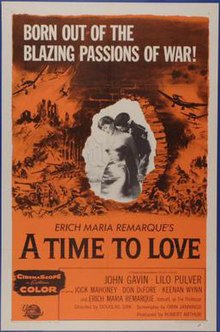A Time to Love and a Time to Die
| A Time to Love and a Time to Die | |
|---|---|

Film poster
|
|
| Directed by | Douglas Sirk |
| Produced by | Robert Arthur |
| Written by | Orin Jannings Erich Maria Remarque |
| Based on | novel by Erich Maria Remarque |
| Starring | John Gavin |
| Music by | Miklós Rózsa |
| Cinematography | Russell Metty |
| Edited by | Ted J. Kent |
|
Production
company |
Universal Pictures
|
| Distributed by | Universal Pictures |
|
Release date
|
|
|
Running time
|
132 minutes |
| Country | United States |
| Language | English |
| Box office | 2.8 million admissions (France) |
A Time to Love and a Time to Die is a 1958 Eastmancolor CinemaScope drama war film directed by Douglas Sirk and starring John Gavin. It is based on the book by the German author, Erich Maria Remarque, set on the Eastern Front, and in Nazi Germany. The film was dubbed All Quiet on the Eastern Front.
Ernst Graeber is a German soldier stationed on the Eastern Front during the war's last days. He and fellow soldiers Steinbrenner and Hirschland are ordered to kill Russian civilians, but Hirschland commits suicide instead.
Given his first furlough in two years, Ernst returns home to find his village bombed and parents gone. Elizabeth Kruse, daughter of his mother's doctor, tells him that her father is being held by the Gestapo as well. Constant air raids interrupt any peaceful moments while Ernst and Elizabeth enjoy their love.
An old friend, Binding, a wealthy Nazi, welcomes Ernst to his home and prepares a feast for the newly wed couple, while a sympathetic professor, Pohlmann, offers his help, should they decide to flee the country.
Ernst is ordered back to the front where he finds Steinbrenner about to shoot arrested Russian civilians. To prevent their shooting Ernst himself shoots Steinbrenner and frees them. One of the prisoners untouched by such sentimentally in a total war retrieves Steinbrenner's rifle and then shoots Graeber. He dies while reading a letter from Elizabeth, telling him that she is expecting their child.
Remarque met Sirk in 1954 and the director persuaded the writer to adapt his own novel for the screen. ("I found him an extraordinarily understanding and capable man", said Remarque. "He knew what he wanted to do with my book.")
Universal decided to cast two relative unknowns in the lead. As studio executive Al Daff said:
We could have put two well-known personalities in it and proceeded on the basis of making a star vehicle. Or we could, as we decided to do, cast the story for believability and put into the lead roles talented, fresh performers who would not have to overcome the handicap of personality identification and could be accepted as a young Nazi officer and his sweetheart.
At one stage Ann Harding was going to play a role.
...
Wikipedia
